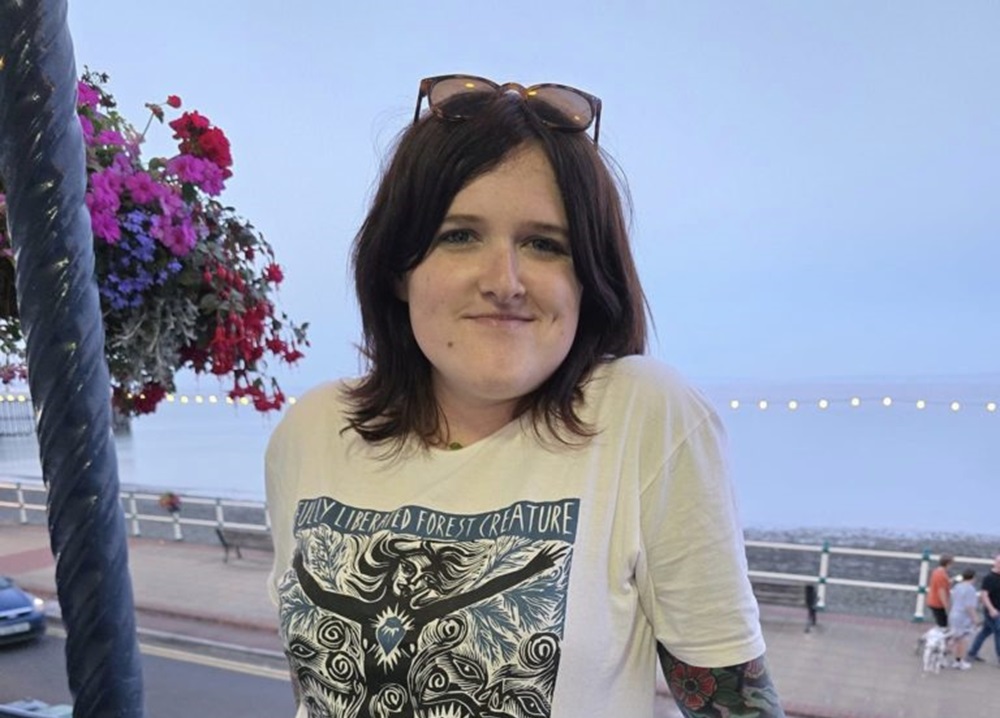On being a poet in Wales: Rhian Elizabeth

Rhian Elizabeth
I don’t cry easily but play me our national anthem and I’ll be in more bits than a stale, crumbling Welsh cake.
I love being Welsh. But I often feel like I have a love/hate relationship with it. Welsh cakes, for a start – can’t stand them. I don’t like rugby. I’m not fussed on Stereophonics or Manic Street Preachers and I’m not a big fan of Dylan Thomas. I don’t speak Welsh, either.
There are other things, too. But firstly let me explain what being Welsh means to me, and why I cry at the anthem. I think this is why.
Wales is my grandparents, long gone now. Their dark living room, the brown wallpaper from a time gone by, the Welsh dresser and the kettle whistling out in the kitchen.
Wales is my grandfather sitting silently in his armchair with his pipe, tobacco falling like snowflakes onto his beard as he puffs out the memories of mines and explosions and war in clouds of smoke because he can’t ever speak of them.
Bingo
Wales is my grandmother in her pinny, an endless supply of mints in wrappers, the rollers set in her hair ready for her night at the bingo, her humour as filthy as coal, her obvious and unconditional love for me as warm as the fireplace it fuels.
Wales is my father. His pigeon shed in the garden, Joan Baez on cassettes in his car, watching me play football from the side lines on freezing cold mornings, when he died and our living room was filled with sadness and flowers, so many flowers.
Wales is my mother who fled the place for Germany at sixteen to join the army and then came back, her pegging washing out on the line, roast dinners every Sunday.
Wales is school assemblies and hymns, St David’s Day costumes, hooks with your name above them to hang your wet coats on. Wales is my childhood friends, our endless mischief, knocking on doors and running away, the fads that came and went like the seasons, Tamagotchis and Pogs and shag bands, making dens in the forest.
Wales is the mountains and streams we roamed in the Rhondda Valley, the maze of terraced streets, the pavements I chalked my name on, the place where poverty and natural beauty live side by side like inconceivable neighbours.
Wales is where I found myself and lost myself and found myself again. Wales is happiness and pain and nostalgia and hiraeth.
Wales is home.
Memories
Wales is the vault that holds all my most precious and formative memories.
And so, being a poet here? That was the actual brief of this thing, wasn’t it? Well, when I write, I roll the numbers on the lock of that vault and open it whenever I sit down to write and Wales is always there, a treasure trove of history and experience and inspiration to call upon and, even though I don’t write about Wales specifically in my poetry, those memories inform who I am and what I think and how I relate to absolutely everything and thus its presence is undeniable in my words.
But being a Welsh poet is a funny old thing for me. Sometimes I feel like Wales is a snowglobe and it’s hard to get out, hard to get our work seen by readers who aren’t in Wales.
Plenty of Welsh poets have had success, of course.– massive success – and I won’t name all the brilliant Welsh poets because there are too many and I’ll forget, but I’ll tell you a small story.
When I was at the Hay Festival some years ago a very Welsh and very famous person came to give a talk and their advice to us, a group of aspiring Welsh writers, was that we shouldn’t bother writing about Wales because it doesn’t sell. Wow.
We are surrounded by this rhetoric, aren’t we? In politics, in sport, in our everyday life. The narrative of Wales as the underdog and the can’t be.
I am proud to be Welsh but at the same time it feels like it is a chain around my neck, a leash yanking this underdog back. There is that confusion always for me. The beauty and the burden of being Welsh, those awkward neighbours that live side by side on the terraced street of my identity.
But if we don’t believe in ourselves, if we don’t champion our stories, who the hell else will?
(Dylan Thomas doesn’t care about my opinions, and Local Boy In The Photograph is a tidy song.)
Rhian Elizabeth’s latest collection, girls etc is published by Broken Sleep Books. It is available from all good bookshops.
Support our Nation today
For the price of a cup of coffee a month you can help us create an independent, not-for-profit, national news service for the people of Wales, by the people of Wales.






Can I suggest that a poet writing in Welsh is near the heart of their culture while a poet writing in English is a much more marginal figure.This is nothing to do with the quality of the poems rathe it reflects the centrality of poetry to Welsh literature.